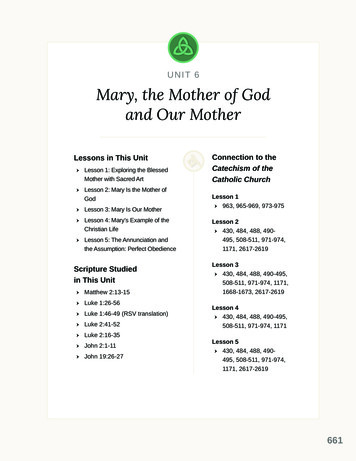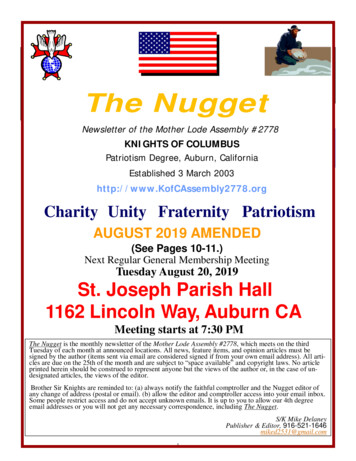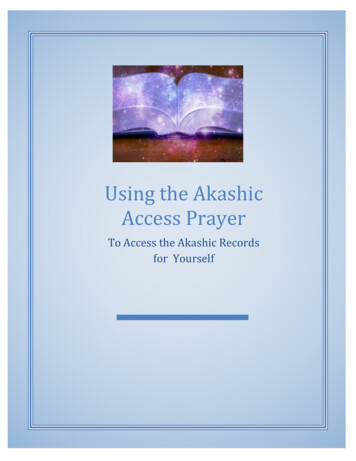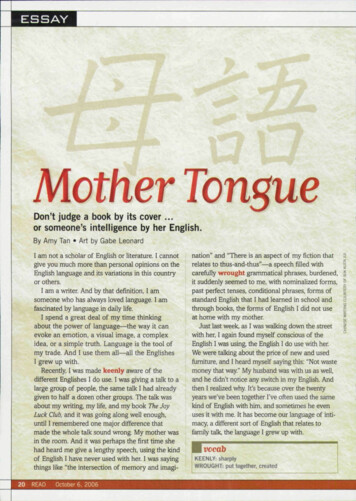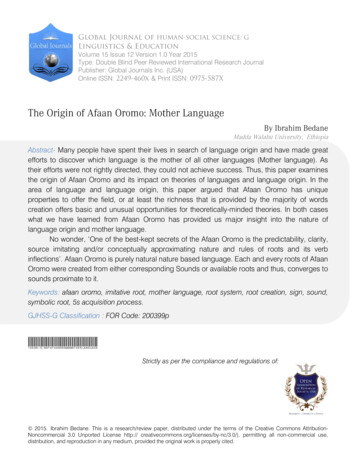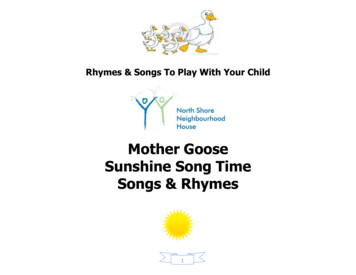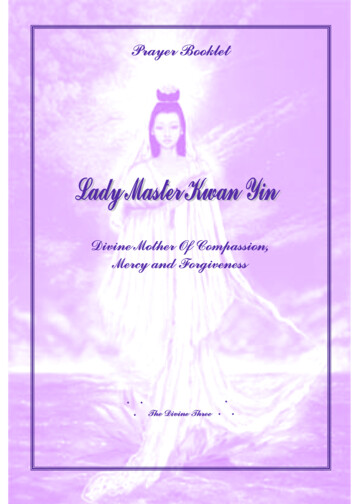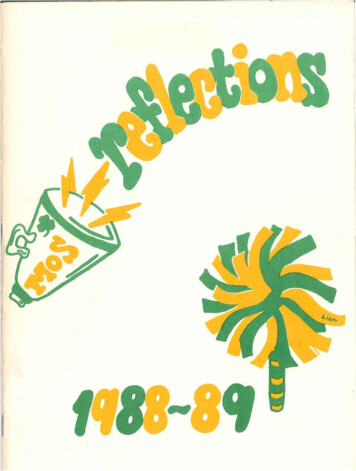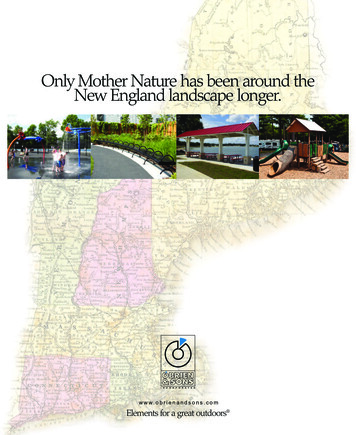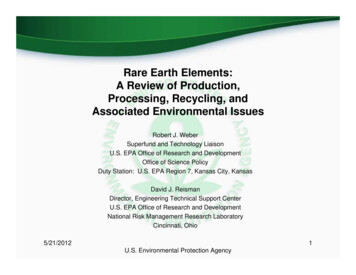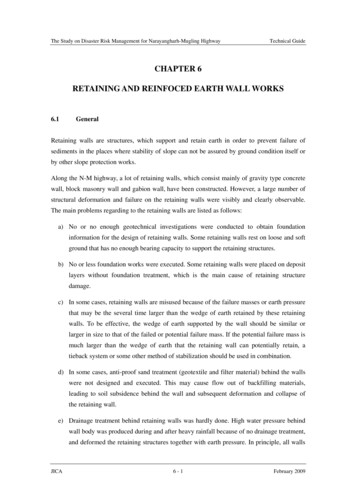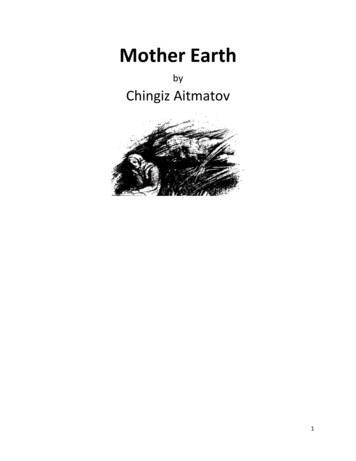
Transcription
Mother EarthbyChingiz Aitmatov1
Father, I know not where you lie buried. I dedicate this to you, Torekul Aitmatov. Mother, you broughtus up, the four of us, I dedicate this to you, Nagima Aitmatova.2
1In her white, freshly-laundered dress, dark quilted jacket and white kerchief she slowly walks along thepath through the stubble. There is not a soul anywhere. Summer is over. No voices can be heard in thefield, no lorries raise a trail of dust on the dirt roads, no harvesters can be seen on the horizon, and theherds have not yet been put out to graze in the stubble.Beyond the grey high road the autumn steppe fades away into the distance. Rows of smoky clouds movesoundlessly above it. The wind sweeps soundlessly over the field, rippling the feather-grass and dryweeds and slips off soundlessly towards the river. There is a smell of wet grass drenched by morninghoarfrost. The earth is relaxing after the harvest. Bad weather will soon set in, the rains will come, thefirst snow will cover the earth and blizzards will rage. But now it is quiet and peaceful.Let's not disturb her. She has stopped and gazes about with the dull eyes of old age."Hello, Field," she calls softly."Hello, Tolgonai. So you've come? You've got much older. Your hair is white. And you carry a staff.""Yes, I'm getting old. Another year has passed, and you, Field, have had another harvest. Today is theday of commemoration.""I know. I've waited for you, Tolgonai. But have you come alone again?""Yes, as you see, I'm alone again.""Then you haven't told him yet, Tolgonai?""No, I didn't dare.""Do you think no one will ever tell him? Do you think no one will ever mention it by accident?""I know. Sooner or later he'll find out. He's bigger now, he might find it out from others. But to me he'sstill a child. And I'm afraid, so afraid to say anything.""A person must learn the truth, Tolgonai.""I know. But how can I tell him? That which I know, that which you know, my beloved field, that whicheveryone also knows, he alone does not know. And when he finds out, what will he think, how will helook upon all that has happened? Will his mind and his heart lead him to the truth? He is still a boy. Thatis why I am uncertain about what I am to do, how, I am to keep him from turning his back on life. I wanthim always to look upon it boldly. Ah, if only it were possible to tell it to him simply, in just a few words,3
like a fairytale. I can think of nothing else these days, for who knows, I might die suddenly. Last winterwhen I fell ill and lay in bed I thought my end had come. It was not death I was afraid of - had it come Iwould not have resisted - but that I would not have time to open his eyes. I feared I would carry his truthaway with me to the grave. He could not understand why I was so anxious. He worried about me, heeven stayed home from school and kept close to my bed, he's the image of his mother, 'Grannie,Grannie! Should I give you your medicine? Or some water? Do you want another blanket?' But I couldnot summon up the courage, I did not have the heart to say anything. He's so trusting, so innocent. Timeflies so quickly, and I cannot think of a way to start the conversation. I pondered it this way and that, butI always came to the same conclusion. If he is to judge all that has happened correctly, if he is tounderstand life properly, I must tell him not only about himself, not only about his own life, but aboutmany other people and their lives as well, about myself and my times and about you, my field, about ourlife, and even about the bicycle he rides to school, never suspecting a thing. Perhaps that is the onlyright way. For nothing can be discarded, nothing can be added: life has mixed us all together in a singlebatter, it has tied us all into a single knot. And such is the story that not every adult can see his way clearthrough it. It has to be experienced to be understood by the heart and the soul. And so I keep thinking. Iknow it is my duty, and if I could fulfil it, I would not be afraid to die.""Sit down, Tolgonai. Don't stand there, your legs are tired. Sit down on that stone and let's think it overtogether. Tolgonai, do you recall the first time you came here?""It's hard to remember, so much has happened since then.""Try to anyway. Try to remember it all from the very beginning."2I recall very dimly that when I was little they would lead me here by the hand during harvesting and sitme in the shade under a haystack. They would leave me a chunk of bread so that I wouldn't cry. Andthen, when I got bigger I would come running here to guard the crops. In the spring they would drive theherds through here to the mountains. I was a fleet-footed young girl with flying hair then. What awonderful, carefree time childhood is! I remember the herdsmen were coming through Yellow Valley.Herd after herd, heading to new pastures, to the cool mountains. When I think of it now I realise howfoolish I was. The herds thundered across the steppe like an avalanche, if you got in their way they'dtrample you in a second. The pillars of dust rose a mile high in the sky, but I would hide in the wheatfield and jump out at them suddenly like an animal and frighten them. The horses would rear up interror, and the drovers would chase after me."Hey, you shaggy-head! Just wait till we get our hands on you!"But I would dodge them and scamper away down the irrigation ditches.4
Rust coloured flocks of sheep passed here day after day, their fatty tails swaying in the dusty air, theirhoofs clattering like hailstones. Black-faced shepherds drove the flocks onward. Then came the nomadcamps of the rich villages with their camel caravans and their wineskins of fermented mare's milk tied tothe saddles. The young girls and young wives, dressed in silks, swayed on their frisky pacers as they sangsongs of green meadows and clear waters. I wondered at them and, forgetting all else, would run a longway after them. "Oh, if only I had such a dress and a tasseled shawl!" I dreamt, gazing after them tillthey disappeared from view. What was I then? The barefoot daughter of a hired farm-hand. Mygrandfather had been made a ploughman for the rest of his life to pay off his debts, and so it went in thefamily. Yet though I never had a silk dress, I grew into an attractive girl. I liked to watch my shadow. Iwould walk along looking at it, as if admiring myself in a mirror. I certainly was a funny girl. I must havebeen seventeen when I met Suvankul during harvesting. That year he came down from Verkhny Talas tohire himself out as a farm-hand. Even now, if I close my eyes, I can see him exactly as he was then. Hewas still very young, about nineteen. He didn't own a shirt but went about with an old quilted jacketthrown over his bare shoulders. He was so black from the sun he looked smoked; his cheekbonesglistened like burnished copper, and though he seemed thin and lanky his chest was strong and his armswere made of steel. You won't often find a worker such as he. We reaped the wheat easily and close tothe ground, all you would hear was the ringing of the sickle and the swish of cut ears. There are peoplelike that: it's a pleasure to watch them work. SuvankuI was such a one. Though they said I was a fastreaper, I could never keep up with him. Suvankul would work his way far ahead, then he would glanceback and return to help me. But that hurt my pride, and I would become angry and chase him off,saying:"Who asked you to come back? Leave me alone, I can manage without you!"He would not take offence. He'd just chuckle and carry on in silence. Why did I get so cross then, silly girlthat I was?We were always the first at work. Dawn would just be breaking, everyone else would still be soundasleep when we set out for the field. Suvankul always waited for me at the edge of the village, on ourpath."Here you are," he would say."I thought you left long ago," I would always reply; though I knew he would never leave without me.And then we would go on together.Meanwhile, the dawn would break, bathing the highest snow-capped mountains in gold, while the windfrom the steppe blew in like a river of the purest blue. These summer dawns were the dawn of our love.When we walked alone together, the whole world seemed different, as in a fairy-tale. And the field, thegrey, trampled, ploughed-up field became the most beautiful field in the world. An early skylark met the5
breaking dawn with us. It would fly up high, ever so high, and hang suspended in the sky like a dot,trembling and fluttering there like a human heart, its song ringing with such abandoned joy."Look, it's our skylark singing!" Suvankul would say. How strange, we even had our own skylark.And that moonlit night? Perhaps there will never be another like it. That night Suvankul and I remainedto reap by moonlight. When the moon, so huge and pure, rose over the crest of that dark mountain, allthe stars in the skies opened their eyes. I thought they could see us. We were lying on Suvankul's jacketat the edge of the field. The crest of the irrigation ditch was our pillow. It was the softest of all pillows.And that was our first night. From that day on we were always together. Suvankul gently caressed myface, my brow and hair with his heavy, calloused hand, communicating through his palm the joyouspounding of his heart."Suvan, we'll be happy, won't we?" I whispered.And he replied:"If the land and the water are divided equally among all men, if we, too, have our own field and if weplough and sow and thresh our own grain, that will be our happiness. A person needs no greaterhappiness, Tolgonai. The tiller's happiness lies in what he sows and reaps."I liked what he said very much, it made me feel so secure. I embraced Suvankul tightly and kissed hishot, weather-beaten face over and over again. Then we bathed in the ditch, splashing and laughing. Thewater was cool and fresh, it sparkled and smelled of mountain winds. And then we lay on the ground,holding hands, looking at the sky and the stars in silence. There were so many stars that night.The earth rejoiced with us that soft blue night. The earth, too, delighted in the coolness and silence.There was a hush over the steppe. Water gurgled in the ditch. The heady smell of sweet clover made usdizzy. It was in full bloom. Now and then a burst of hot, sage-laden wind would rush by, making the earsof grain on the boundary sway and rustle. Perhaps there was only one such night ever. At midnight, inthe dead of night, I looked up at the sky and saw the Way of the Reaper, the Milky Way, stretch straightacross the heavens, a wide silvery path among the stars. I recalled Suvankul's words and thought thatperhaps a kind and mighty tiller had really crossed the sky this night with a great armful of straw, leavingin his wake a trail of fallen chaff and grain. And suddenly I imagined that if our wishes ever came true mySuvankul would also carry a great armful of straw of the first threshing across the threshing-floor. Itwould be the first armful of straw from our own grain. And as he would carry this fragrant straw, hewould leave a trail of chaff behind. That is what I dreamed, and the stars shared my dream. Suddenly Iwished desperately that all this would come true. Then, for the first time, I spoke to Mother-Earth as Iwould to a human being. I said: "Earth, you suffer us all on your breast; if you do not give us happiness,then why are you Earth and why are we born? We are your children, Earth. Bring us happiness, make ushappy!" This is what I said that night.6
Next morning I awoke and saw that Suvankul was not by my side. I do not know when he rose, it musthave been very early. New sheaves of wheat were piled up everywhere in the stubble. I felt hurt, for Iwould have loved to work by his side in the early hours."Suvankul, why didn't you waken me?" I shouted. At the sound of my voice he glanced back. I rememberhim as he was that morning: stripped to the waist, his strong, dark shoulders glistening with sweat. Hestood there and his expression was one of joy and puzzlement; as if he did not recognise me. Then,wiping his face, he said with a smile:"I wanted you to sleep a little longer.""But what about you?" I asked."I'm working for two now," he replied.At this I felt wounded, I nearly wept, though my heart rejoiced."But where are your promises of yesterday?" I reproached him. "You said we would be equal ineverything, as one person."Suvankul threw down his sickle, ran over, caught me up and said through his kisses:"From now on we shall be as one in everything, my dearest, sweetest skylark!"He carried me about in his arms, talking to me, calling me his skylark and other funny names, while Itwined my arms about his neck, giggled and kicked and laughed, for only little children are calledskylarks, and yet how wonderful it was to hear those words!The sun was just coming up, the corner of its eye was rising over the mountain. Suvankul set me down,put his arm round my shoulders and suddenly shouted to the sun:"Hey, Sun! Look, here's my wife! See what a wife I have! Pay me for looking at the bride with your rays,pay me with your light!"I don't know whether he said this in jest or in earnest, but suddenly I began to cry. I just couldn’t holdback the joy that filled my heart to overflowing.I think of it now and cry, silly me. For those were very different tears, they are given to a person onlyonce in a life time. And did our life turn out as we dreamed? Yes, it did. Suvankul and I fashioned our lifewith our own hands, we worked hard, never putting down our hoe, come summer or winter. Truly, wewatered the field with our sweat. Then in new times we built a house and had a few head of cattle. In aword, we began to live a decent life. But the greatest joy was the birth of our sons, three of them, one7
after the other, and all fine boys. Sometimes a terrible feeling of remorse sears my soul and foolishthoughts plague me: why did I have them every year
I liked to watch my shadow. I would walk along looking at it, as if admiring myself in a mirror. I certainly was a funny girl. I must have been seventeen when I met Suvankul during harvesting. That year he came down from Verkhny Talas to hire himself out as a farm-hand. Even now, if I close my eyes, I can see him exactly as he was then. He was still very young, about nineteen. He didn't own a .
